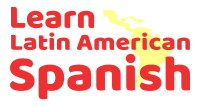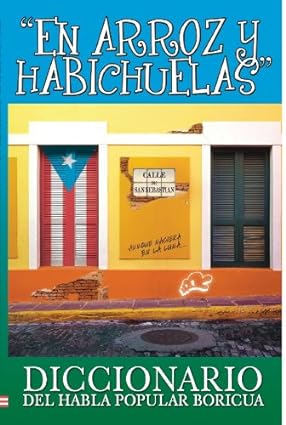|
Puerto Rican Spanish: A Guide to the Spanish Dialect of Puerto Rico (Audiobook)
This audio guide focuses on the Spanish dialect as spoken in Puerto Rico and also includes an overview of Puerto Rican culture as expressed through its language. Content is organized into more than ten simple sessions, including the opportunity to review content later in the course. Topics covered include vocabulary that you can put to use daily, topics such as food, numbers, places, and many others. Before you know it, you will build an intermediate understanding of Puerto Rican Spanish through this course, including an understanding of some of the important nuances of Puerto Rican linguistics and culture. |
An Overview of Puerto Rican Spanish
Native speakers: 6 million.
Puerto Rican Spanish is the Spanish language as characteristically spoken in Puerto Rico and by millions of people of Puerto Rican descent living in the United States and elsewhere. It belongs to the group of Caribbean Spanish variants and, as such, is largely derived from Canarian Spanish and Andalusian Spanish. Outside of Puerto Rico, the Puerto Rican accent of Spanish is also commonly heard in the US Virgin Islands and many US mainland cities like Orlando, New York City, Philadelphia, Miami, Tampa, Boston, Cleveland, and Chicago, among others. However, not all Stateside Puerto Ricans have knowledge of Spanish. Opposite to island-born Puerto Ricans who primarily speak Spanish, many stateside-born Puerto Ricans primarily speak English.
Puerto Rican accents, both in Spanish and English, could be described as a reflection of Puerto Rico's historical ethnic cultures.
Puerto Rican Spanish, like the language of every other Spanish-speaking area, has its distinctive phonological features ("accent"), which derive from the indigenous, African, and European languages that came into contact during the history of the region. The accents of River Plate Spanish (Argentina and Uruguay), for example, were heavily influenced by the presence of Italians in those countries.
In the case of Puerto Rico, Spaniards arrived from many regions within Spain and brought with them their own regional dialects/accents. A large number of Spaniards came in particular from a region of southern Spain, Andalusia, and many others arrived from Spain's islands off the coast of North Africa, known as the Canary Islands. When visiting Tenerife or Las Palmas (Islas Canarias, Spain), Puerto Ricans are usually taken at first hearing for fellow Canarians from a distant part of the Canary archipelago. It is the accents of those regions that were as the basis of the accent of Spanish that is spoken in Puerto Rico. (Rioplatense Spanish in Uruguay was once influenced by Canarian accents, like Puerto Rican and other Caribbean accents themselves)
The indigenous population of Taínos left many words in the names of geographical areas of the Island (Jayuya, Mayagüez, etc.), and others are used to name everyday items such as hamaca ('hammock') or to describe natural phenomena such as huracán ('hurricane').
Africans in Puerto Rico were brought in as slave labor, mostly to work on coastal or lowland sugar plantations. They contributed a large number of words to colloquialisms and island cuisine, introduced words, and influenced the speech rhythms. That can be noticed by visiting the parts of the island where they have historically been present (almost exclusively along the coasts). Also, the Afro-Caribbean/West Indian patois/Creole linguistic presence is very strong and has influenced Puerto Rican culture, as is reflected in music (such as reggae) and culinary dishes.
Chinese Puerto Ricans and other Asians who have established themselves in Puerto Rico also adopt the accent, but with a tinge of an East Asian.
The Puerto Rican accent is somewhat similar to the accents of the Spanish-speaking Caribbean basin, including Cuba and the Dominican Republic, and those from the Caribbean/coastal regions of Venezuela, Colombia, Panama, Honduras, and Nicaragua (particularly to a non-Puerto Rican). However, any similarity will depend on the level of education of the Puerto Rican speaker and their immediate geographic location. It also continues to be extremely similar to the accent of the Canary Islanders and Andalusians in southern Spain. Overall, most Puerto Ricans make an emphatic distinction between their accent and other Caribbean Spanish accents.
Source: Wikipedia
Puerto Rican Spanish is the Spanish language as characteristically spoken in Puerto Rico and by millions of people of Puerto Rican descent living in the United States and elsewhere. It belongs to the group of Caribbean Spanish variants and, as such, is largely derived from Canarian Spanish and Andalusian Spanish. Outside of Puerto Rico, the Puerto Rican accent of Spanish is also commonly heard in the US Virgin Islands and many US mainland cities like Orlando, New York City, Philadelphia, Miami, Tampa, Boston, Cleveland, and Chicago, among others. However, not all Stateside Puerto Ricans have knowledge of Spanish. Opposite to island-born Puerto Ricans who primarily speak Spanish, many stateside-born Puerto Ricans primarily speak English.
Puerto Rican accents, both in Spanish and English, could be described as a reflection of Puerto Rico's historical ethnic cultures.
Puerto Rican Spanish, like the language of every other Spanish-speaking area, has its distinctive phonological features ("accent"), which derive from the indigenous, African, and European languages that came into contact during the history of the region. The accents of River Plate Spanish (Argentina and Uruguay), for example, were heavily influenced by the presence of Italians in those countries.
In the case of Puerto Rico, Spaniards arrived from many regions within Spain and brought with them their own regional dialects/accents. A large number of Spaniards came in particular from a region of southern Spain, Andalusia, and many others arrived from Spain's islands off the coast of North Africa, known as the Canary Islands. When visiting Tenerife or Las Palmas (Islas Canarias, Spain), Puerto Ricans are usually taken at first hearing for fellow Canarians from a distant part of the Canary archipelago. It is the accents of those regions that were as the basis of the accent of Spanish that is spoken in Puerto Rico. (Rioplatense Spanish in Uruguay was once influenced by Canarian accents, like Puerto Rican and other Caribbean accents themselves)
The indigenous population of Taínos left many words in the names of geographical areas of the Island (Jayuya, Mayagüez, etc.), and others are used to name everyday items such as hamaca ('hammock') or to describe natural phenomena such as huracán ('hurricane').
Africans in Puerto Rico were brought in as slave labor, mostly to work on coastal or lowland sugar plantations. They contributed a large number of words to colloquialisms and island cuisine, introduced words, and influenced the speech rhythms. That can be noticed by visiting the parts of the island where they have historically been present (almost exclusively along the coasts). Also, the Afro-Caribbean/West Indian patois/Creole linguistic presence is very strong and has influenced Puerto Rican culture, as is reflected in music (such as reggae) and culinary dishes.
Chinese Puerto Ricans and other Asians who have established themselves in Puerto Rico also adopt the accent, but with a tinge of an East Asian.
The Puerto Rican accent is somewhat similar to the accents of the Spanish-speaking Caribbean basin, including Cuba and the Dominican Republic, and those from the Caribbean/coastal regions of Venezuela, Colombia, Panama, Honduras, and Nicaragua (particularly to a non-Puerto Rican). However, any similarity will depend on the level of education of the Puerto Rican speaker and their immediate geographic location. It also continues to be extremely similar to the accent of the Canary Islanders and Andalusians in southern Spain. Overall, most Puerto Ricans make an emphatic distinction between their accent and other Caribbean Spanish accents.
Source: Wikipedia
Puerto Rican Spanish Learning Books
|
Puerto Rican Spanish 101: Bilingual Guide to the Unique Words and Expressions of Puerto Rico
Puerto Rico is a Spanish-speaking island in the Caribbean with an unmistakably rich and welcoming culture. The Spanish spoken by boricuas is distinct and unique, and you didn't learn it in your Spanish class. This guide contains over 150 uniquely Puerto Rican words and expressions with definitions and examples in both Spanish and English. If you plan to visit PR, or want to be able to talk to the over 5 million Puerto Ricans that live in the mainland United States, you'll want to have this book on hand. |
|
Speaking Boricua: A Practical Guide to Puerto Rican Spanish
Speaking Boricua is a humorous guide to Puerto Rican Spanish. With over 1500 Puerto Rican words and phrases, you will quickly understand Puerto Rican slang. Cartoon photos illustrate many of the words and phrases in an entertaining way. By using a few of these words your Puerto Rican friends will be laughing hysterically. Words such as tripear, un quita'o, bregar, coraje, serrucho, mahón, cafre, palo, zafacón, china, fumón and mofongo will quickly become part of your everyday Puerto Rican vocabulary. The book also includes pronunciation and grammar sections that teach you how to speak and understand Puerto Rican. Symbols let you know when a word is naughty, similar to English, or commonly used. This book is the most in-depth, up-to-date source of Puerto Rican Spanish available. |
|
Speaking Phrases Boricua: A Collection of Wisdom and Sayings From Puerto Rico
This follow-up to the Puerto Rican bestseller, Speaking Boricua, collects the unique Puerto Rican sayings that are passed down from generation to generation. Whether you are looking to share your life’s wisdom with Island friends, trying to get a chuckle from colleagues or just want to better understand Puerto Ricans, Speaking Phrases Boricua offers both English and Spanish details for these wisdoms. In Speaking Phrases Boricua, hundreds of common sayings are translated literally into English, explained and, when available, paired with an English equivalent. Speaking Phrases Boricua continues the tradition of Speaking Boricua by using humor to illustrate phrases and their meanings. There is even an index of English sayings with Puerto Rican equivalents and 47 illustrations. This book will bring you even closer to understanding Puerto Rican vocabulary and phrases for your conversations as you become more fluent in Puerto Rican Spanish. |
|
Puerto Rican Spanish: Learning Puerto Rican Spanish One Word at a Time
No matter whether you are traveling to the island of Puerto Rico as a tourist, or for Hurricane disaster aid, this hip pocket book will serve you well. You probably already know the Spanish spoken by boricuas (native Puerto Ricans) is a distinct and unique idiom, rich with words and phrases they don't teach in Spanish class. This guide contains a wealth of words and expressions that you can look up when you hear or read them in order to know what is going on around you. Even better, one would spend a night with the book reading it in order to gain familiarity with the wisdom it contains. that way, when you hear a vaguely familiar word, you will know which page to consult. |
|
Stories from Puerto Rico / Historias de Puerto Rico
This book features Spanish and English stories side by side to help you practice and improve your reading skills in your new language while enjoying the support of your native tongue. The practical format spares you the inconvenience of constantly having to look up unfamiliar words and expressions in a dictionary. Simply read as much as you can understand in your new language and refer to the facing page for help, if needed. The book includes 16-well known stories chronicling Puerto Rican history and mythology. You’ll gain valuable insights into Puerto Rican culture as you sharpen your language skills. |
|
De Boca en Boca: Diccionario de refranes y decires puertorriqueños (Spanish Edition)
Dictionary of Puerto Rican Sayings and Expressions is an act of retelling, a look back, an awareness, a collection, an invitation, a bridge between grandparents and grandchildren. These young people constitute the emerging point of a culture that breaks, both with the culture based on the knowledge and memory of the elderly, and with the one whose referents, although shifting, link the behavior patterns of the young to those that the parents who, with some variations, they picked up and adapted from their grandparents. Dictionary of Puerto Rican Sayings and Expressions is not only a set of words, categories and rules with which the people interpret their world of interests and that have translated their experience of reality, but a set of small capsules of knowledge, expressions hardened by the force of use, burnished from so much passing from mouth to mouth, which people use in their daily life. |
|
Refranes, dichos y expresiones de Puerto Rico (Spanish Edition)
A compendium of more than 1,500 sayings and expressions used on the Island of Puerto Rico. |
|
En Arroz y Habichuelas: Diccionario del Habla Popular Boricua / In Rice and Beans: Popular Boricua Speech Dictionary (Spanish Edition)
The work carried out here by Ixa López Paláu joins a tradition of rescuing Puerto Rico's distinctive language, a recovery of the constituent elements of its linguistic history, which is essential to understand it as a nation. It has been a work of dedication, thoroughness, and patience that future generations of Puerto Ricans will be grateful for. |
Puerto Rican Spanish Language Courses
|
1-on-1 Spanish tutoring at italki
One-on-one language tutoring at italki is hands down the most efficient way to reach language fluency. That's why it is the most popular platform today for learning a language online. You can practice conversational skills under different real-world scenarios with a native speaker tutor of your choice who provides you with undivided attention and customized lessons that cater to your learning needs and interests. Whether you’re at home, at the airport, or at your local park, you have complete access to learning Puerto Rican Spanish or any other language you want with a native speaker from any country of your choice. SPECIAL OFFER: Get $10 italki credits by joining via this link. |
|
Spanish Uncovered: The World’s First StoryLearning Spanish Home Study Course
This new, science-based language learning method was invented by polyglot language expert Olly Richards, who has authored more than a dozen best-selling language books available in bookstores around the world and on Amazon.com. This was the method he used to learn eight languages, and is the exact same method he has been using to help thousands of students learn Spanish. The course comes in both Castilian and Latin American versions, which means that it works for you whatever variety of Spanish you're learning. Find out more! |
|
Baselang's Real World 1-on-1 Spanish tutoring
This top-rated program offers UNLIMITED 1-on-1 Spanish tutoring where you can take as many online Spanish classes as you want, on a daily basis if you wish, with their professional teachers from all around Latin America for a monthly flat rate. Baselang's classes are specifically tailored to your level, from zero to advanced. Don't miss this amazing opportunity! |
|
Preply
Preply is a global online language learning platform designed to promote faster learning with one-on-one online tutors. It connects language tutors with millions of learners from all over the world. You can choose from thousands of Spanish teachers from any country of your choice available in the platform. Book a lesson with a private Spanish teacher today and start learning. Not entirely happy with your tutor? No worries, Preply offers free tutor replacement till you're 100% satisfied. |
Puerto Rican Spanish Learning Podcasts
|
Podcast on Puerto Rico by Lengalia
Listen to native speakers from Puerto Rico telling interesting facts about their country, culture and language in Puerto Rican Spanish accent. |
Puerto Rican Spanish Learning Blogs
|
30 Puerto Rican Slang Terms That Only Make Sense In The Caribbean
An excellent blog article on Puerto Rican Spanish slang by Baselang. With Baselang's UNLIMITED 1-on-1 online Spanish tutoring you can take as many online Spanish classes as you want with their professional teachers for a monthly flat rate. Don't miss the opportunity! |
|
The Puerto Rican Dialect: An Essential Guide to Sounding Like a Boricua
A nice blog article on Puerto Rican Spanish by Besanya Santiago Ayala, a Puerto Rican actress, world traveler and writer based in New York City. |
|
14 Colorful Puerto Rican Spanish Phrases You’ll Use All the Time
A great blog article on Puerto Rican Spanish slang by FluentU. |
1-on-1 Puerto Rican Spanish Lessons at italki
|
italki is the most flexible and affordable language learning platform that connects students with the most dedicated teachers around the world for 1-on-1 online language tutoring through video chat. At italki, you can choose an experienced Puerto Rican Spanish teacher for your personal tutor based on your goals and interests.
Here is a step-by-step instruction to find a native Puerto Rican Spanish teacher at italki:
Good luck and enjoy your lesson! |
Home | About | Contact Us | Disclosure | Privacy Policy
This page contains affiliate links. For more information, see our disclosure page.
Copyright © 2024 LearnLatinAmericanSpanish.com
This page contains affiliate links. For more information, see our disclosure page.
Copyright © 2024 LearnLatinAmericanSpanish.com























